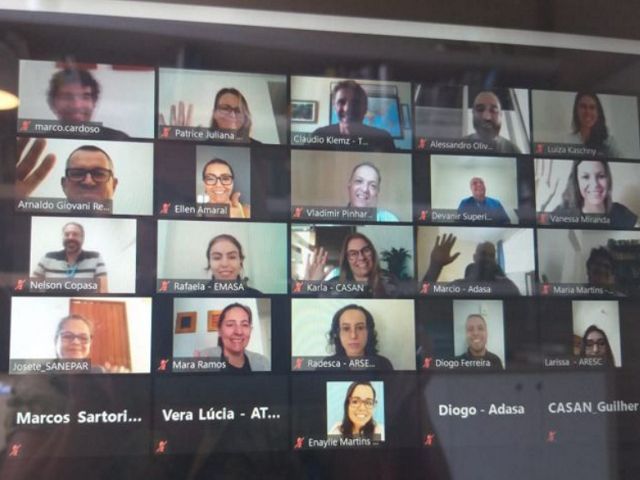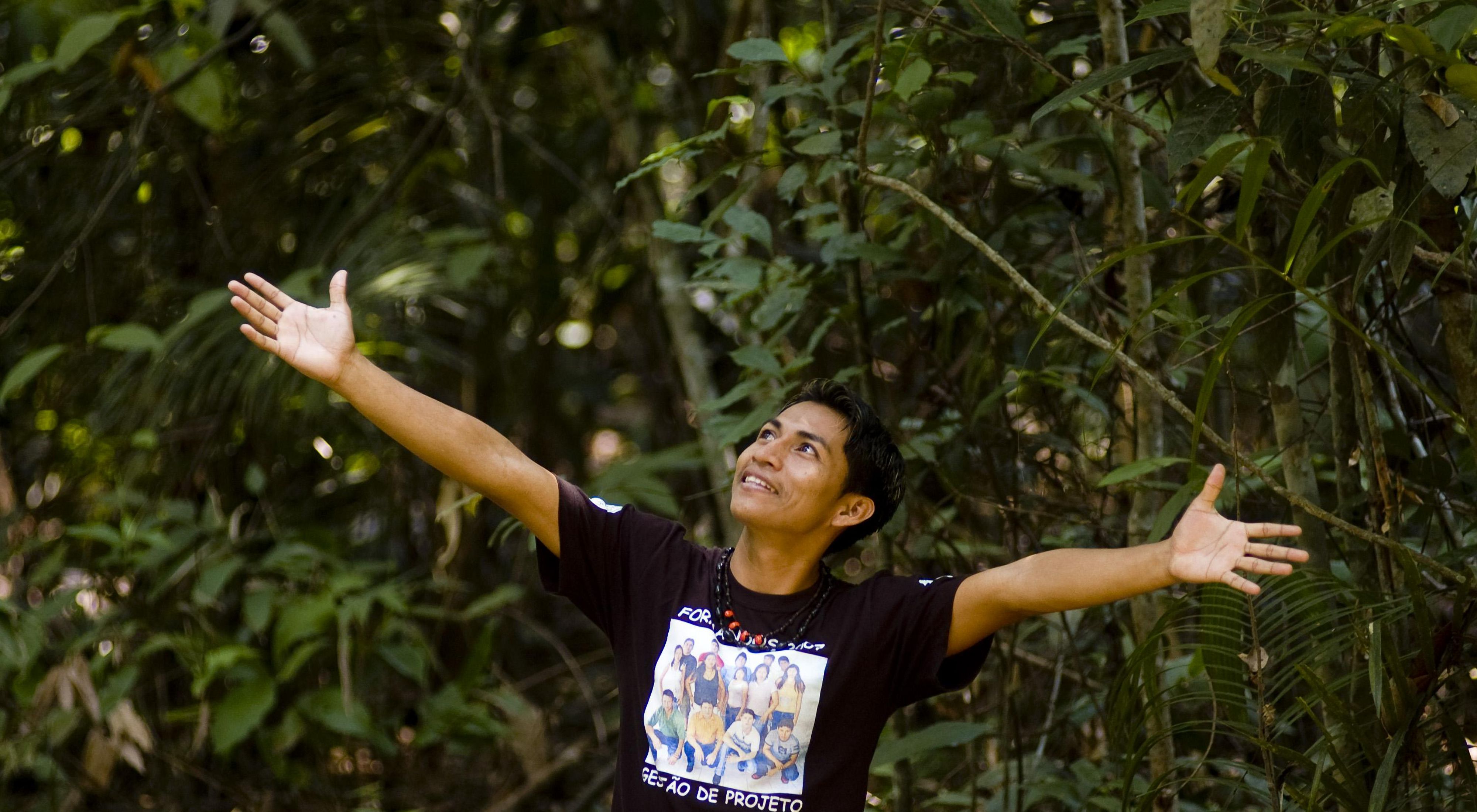Specialists discuss the role of the sanitation sector on the conservation of water sources for cities in Brazil
The virtual workshop brought together representatives from all regions of the country
Between April 14th and 15th, more than 70 representatives from sanitation regulatory agencies and water utilities from all over Brazil gathered to participate in the 1st "Springs Conservation and Sanitation Regulation" workshop. The event was held via videoconference due to a collaboration between the Public Services Regulatory Agency of Santa Catarina State (ARESC), the São Paulo State Sanitation and Energy Regulatory Agency (ARSESP), the Water, Energy and Basic Sanitation Regulatory Agency of the Federal District (ADASA), and the Brazilian Association of Regulatory Agencies (ABAR) and The Nature Conservancy (TNC), with the support of the Latin American Water Funds Partnership and the Green Blue Water Coalition.
The workshop's objective was to promote the exchange of experiences in the conservation of water sources and the role of the sanitation sector among various teams working across the country. The initiative is part of the Thematic Group for the Conservation of Springs of ABAR's Basic Sanitation Technical Chamber (CTSan). Luíza Burgardt, from ARESC, and Alessandro Oliveira, from ARSESP, who coordinate the Thematic Group presented the 2020 planning of activities that include the incorporation of spring conservation actions as part of the basic sanitation sector's activities. The group is drafting a reference document aimed at all Brazilian regulatory agencies to level knowledge around regulatory practices that allow utilities to invest in nature-based solutions to improve water security.

On the first day, ongoing watershed conservation initiatives led by regulatory agencies and water utilities in Brazil were presented. TNC and partners shared lessons learned from the Camboriú River Water Producer project, led by the Balneário Camboriú Water Utility (EMASA) in Santa Catarina state, and Ribeirão Pipiripau Water Producer project, coordinated by a group of institutions including Federal District water utility (CAESB)and the regulatory agency (ADASA). Participants also heard about the work of the São Paulo state water company, SABESP's Metropolitan Waters Green Belt Program, and the statewide Water Source Protection Program, coordinated by Minas Gerais state Regulatory Agency (ARSAE) and implemented by the state water company, COPASA. Presentations were driven by questions that served to introduce the concept of nature-based solutions and to promote the discussion. Operational and accounting perspectives, technical and legal support, including obstacles and opportunities for the conservation of springs by the sanitation sector were explored in depth.
Cláudio Klemz, Specialist in Public Policies for Water at TNC Brasil, spoke about the role of service providers in protecting water sources in the country, together with the consulting company M. Granziera. They addressed the integration between the environment, water resources and basic sanitation public policies. "The Brazilian sanitation regulatory system enforcement is growing strong lately and has been promoting important efficiency improvements to the sanitation sector. Our joint work, supported by the International Climate Protection Initiative (IKI), promotes the innovative concept that the sanitation business services does not begin at the water intake point, instead water utilities’ business starts with the protection of its water sources, and we need public policies to strengthen those efforts," explained Cláudio.
The business of water utilities starts with the protection of water sources and we need public policies to strengthen those efforts
Cláudio Klemz
Specialist in Public Policies for Water at TNC Brasil
Discussion groups approached the incorporation of watersheds conservation investments as part of the water tariffs structure. For Jorge Enoch Lima, Director of the Federal District Water, Energy and Basic Sanitation Regulatory Agency (ADASA), this is a very current discussion since society has been asking for conservation projects. "Debates like these are crucial to find a common denominator. The integration between society, the water concessionaires and the regulatory agencies as intermediaries, is essential in this process so that we can guarantee quality water, maintain our basins and keep water treatment at low costs, without increasing tariffs," says Jorge.
According to Luiza Borges, ARESC's Inspection Manager, the sanitation sector is a major water resources user and should contribute to its conservation. She believes that regulators can encourage service providers to adopt practices to protect their supply water sources, aiming at water security and the quality of raw water that enters water treatment plants. "ARESC guarantees these investments through the water tariff, thus promoting sustainability in the provision of the service," stresses Luiza.
The importance of the discussion was emphasized by ARSESP President, Hélio Castro. He explained that those who regulate and those regulated have the same objective, which is the best provision of service by the water utilities. "The workshop achieved its purpose of evaluating and discussing the interaction between water resources and sanitation and how water supply companies can take ownership of improving the conditions of the water sources. In the end, one should consider that conserving watersheds to guarantee the quality and availability of water will have an impact on the treatment cost of those waters," says Hélio.
This workshop is an important step for TNC’s water policy agenda. According to Samuel Barreto, Water Manager at TNC Brazil and representative of the Latin American Water Funds Partnership, “it contributes with innovation and conceptual improvements for the sanitation sector at large in Brazil, driving us towards the accomplishment of the UN Sustainable Development Goal number 6. The learnings from the Santa Catarina state case, which created the water tariff long-term financial sustainability mechanism for watersheds conservation, paves the way larger scale replication for water security in other regions as São Paulo, Minas Gerais and the Federal District. The Brazilian initiative interacts with other similar experiences with the sanitation sector in Latin America, amplifying water security through nature-based solutions.”
The workshop was co-financed by the International Climate Protection Initiative (IKI) of the Federal Ministry of Environment, Nature Protection and Nuclear Safety (BMU) of the Government of Germany, through the Inter-American Development Bank, both organizations are partners of the Latin American Water Funds Partnership. The event had the support of the Blue-Green Water Coalition, a TNC initiative to guarantee water security to the population in the metropolitan regions of Brazil. The 2nd Workshop on Water Conservation and Sanitation Regulation is scheduled for June 2020.
